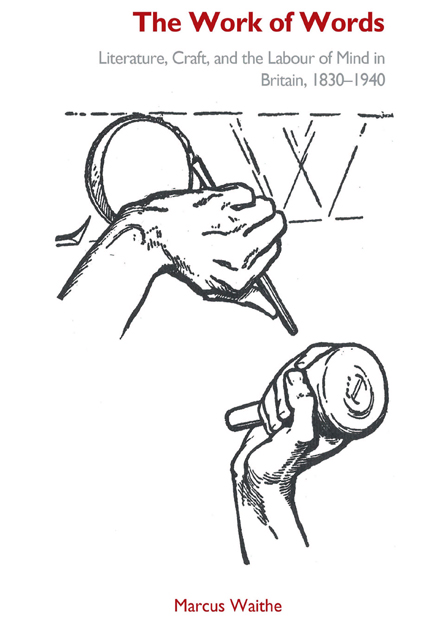6 - Modernism and the Maker
Published online by Cambridge University Press: 13 April 2023
Summary
Virginia Woolf once observed that ‘there is something incongruous, unfitting, about the term “craftsmanship” when applied to words’. Spoken as part of a late BBC broadcast on ‘Craftsmanship’ (1937), her thoughts bear on the legacy of the Arts and Crafts movement, notably the persistent comparison of literature to practical activities such as weaving. Gladstone, as we have seen, suppresses the cunning in craft in favour of a manual dexterity reconciled with paternal oversight. For Morris, the ‘stones close-fitting’ of Odysseus’s ‘well-builded’ (13:340) house symbolise a holistic civilisation: ‘cunning’ he can accept in return for the dramatic fruits of its mischief. Woolf, by contrast, suspects a futility for the writer in eliminating the ‘draught between the frames of the windows’. While this seems at odds with her tactile delight in setting up a handpress for the Hogarth venture, and with the equally Morrisian flavour of the painted surfaces created by her friends at Charleston, she evidently senses a threat to truth: ‘“craft”’, she notes ‘[…] means in the first place making useful objects out of solid matter – for example, a pot, a chair, a table’, and ‘In the second place, […] cajolery, cunning, deceit.’ Pressing language into instrumental service, it follows, compromises its most valued function: ‘words’, she warns, ‘never make anything that is useful; and words are the only things that tell the truth’.
Woolf’s portrayal of artistic enterprise in To the Lighthouse (1927) broadly anticipates this account: Lily Briscoe’s abstraction in colour resists both the art-as-toil thesis, and the heroic cast of Mr Ramsay’s brain-work. The interrupted dignity of Wagnerian ‘hammering’ that runs through the opera scene in The Years (1937) signals a related ambivalence. Woolf was not alone in repudiating the craft ideal: Wyndham Lewis expresses similar sentiments in describing the Omega Workshops as ‘Mr Roger Fry’s little belated Morris movement’. Indeed, the art and literature of the 1920s tend to evoke intellectualism, a defiant restoration of the mind’s independence over the body. In the familiar account, modernist writers installed Bergsonian perceptualism, self-conscious artifice, machine-worship, and abstraction, in place of the Ruskinian ‘hand’. The many amputees produced by the Great War complicated the very idea of embodied human agency: the Siemens-Schuckertwerke Universal Arm, for instance, linked worker prostheses directly to the parts of machines.
Information
- Type
- Chapter
- Information
- The Work of WordsLiterature, Craft, and the Labour of Mind in Britain, 1830-1940, pp. 181 - 226Publisher: Edinburgh University PressPrint publication year: 2023
